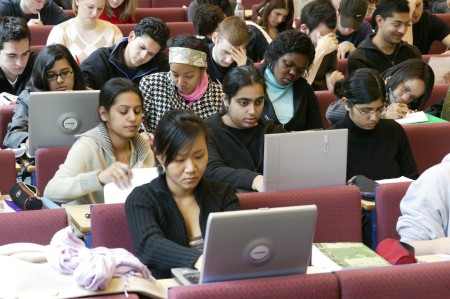Researchers find it’s Britain getting the benefits
Overseas students in London have contributed a net gain to the economy of £2.3bn, according to research by Big Four business consultancy PricewaterhouseCoopers (PwC).

International students bring in a total of £2.8bn through spending in the UK, but consume only £540m in public spending, which puts paid to myths that they burden public services. In addition, 70,000 people are employed solely or mainly because of cash spent by overseas students.
Immigration is a burning political issue and may have been pivotal in deciding the outcome of this month’s General Election. Through no fault of their own, international students were pulled into the debate because they are included in the net migration target statistics so often quoted by politicians.
David Cameron’s previous coalition government hit international students and institutions focussed on their education hard in his failed quest to meet targets set in the Conservative Party’s 2010 manifesto. As a consequence, students from overseas were made to feel like they were on the receiving end of anti-immigration rhetoric, a situation that could be avoided by reclassifying them as temporary stayers.
While politicians recognise the importance of international students, there has been considerable debate over the economic value. This is the first study to quantify the benefits of student migration.
PwC described London’s higher education system as an export success story as 92% of students said they would recommend studying in the UK to their friends and family. Additionally, 60% said their experience would encourage them to do business in the UK after studying here.
More than a third of international students said, however, that Britain’s complex immigration legislation negatively affected their experience of studying in the UK. They also criticised the system for making it difficult to secure work after completing their studies.
Baroness Jo Valentine, CEO of business lobby London First, warned that anti-immigration rhetoric would negatively impact UK universities’ abilities to attract talent and called on the government to challenge the stigma.
“International students are made to feel unwelcome because of anti-immigration rhetoric – and the fact that they are currently included in the government’s net migration target,” Valentine said.
“But students’ expenditure here is a modern-day export: they pay substantial fees and contribute significantly in consumer spending.”
Baroness Valentine called on the government to follow the examples set by Australia and Canada to reclassify international students as temporary visitors and not migrants.
“It makes no sense to imply through classification and rhetoric that they are unwelcome, which is harming our universities’ abilities to sell education to talented students around the world,” she said.
The report calls for the government to:
- Use hard data when setting immigration targets: There’s a real opportunity to develop better data collection on migration so that we can see the real facts on inward and outward flows.
- Classify students as temporary visitors not migrants: we should follow the lead of other countries such as Canada and Australia and stop classifying students as immigrants. They are here for a short time only and by choosing to study in the UK, they are contributing to jobs, growth and cultural understanding in this country.
- Create an environment where British-educated overseas talent is valued as an asset rather than treated as a liability: the government should reinstate the automatic option or make it easier for international students to work here for a few years after graduation; this would be good for UK universities, good for UK business, and good for Britain’s long-term relations with the global business community when these graduates return to their home countries.
Julia Onslow-Cole, PwC’s head of global immigration, said more hard data was needed to better inform government immigration policies.
“While politicians recognise the importance of international students, there has been considerable debate over the economic value,” Onslow-Cole said, adding: “We need more hard data like this to inform immigration policies and targets.
“The £2.3bn benefit of international students illustrates there is a huge amount at stake.”








